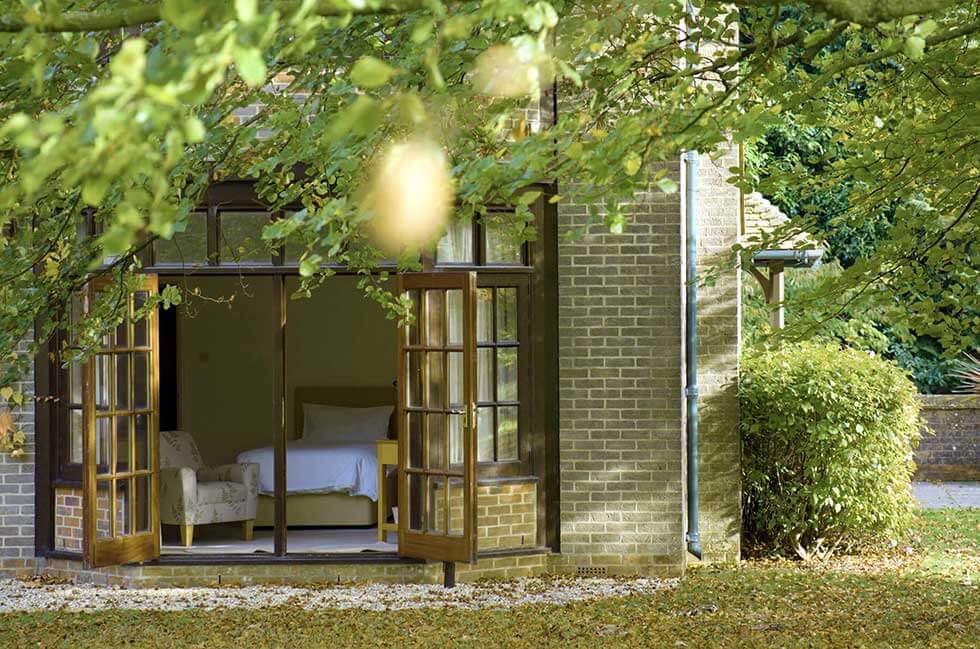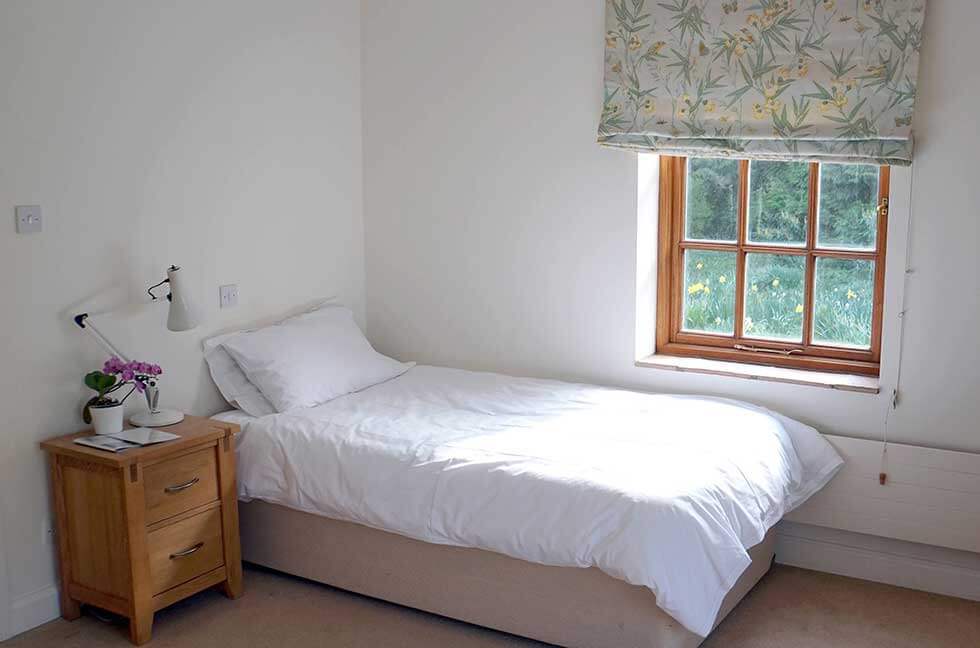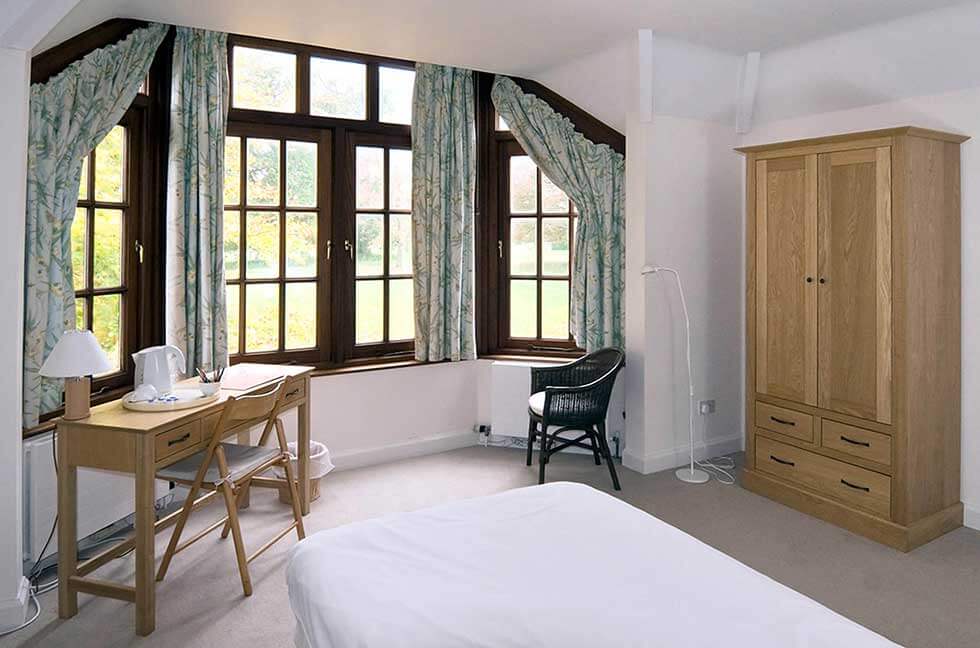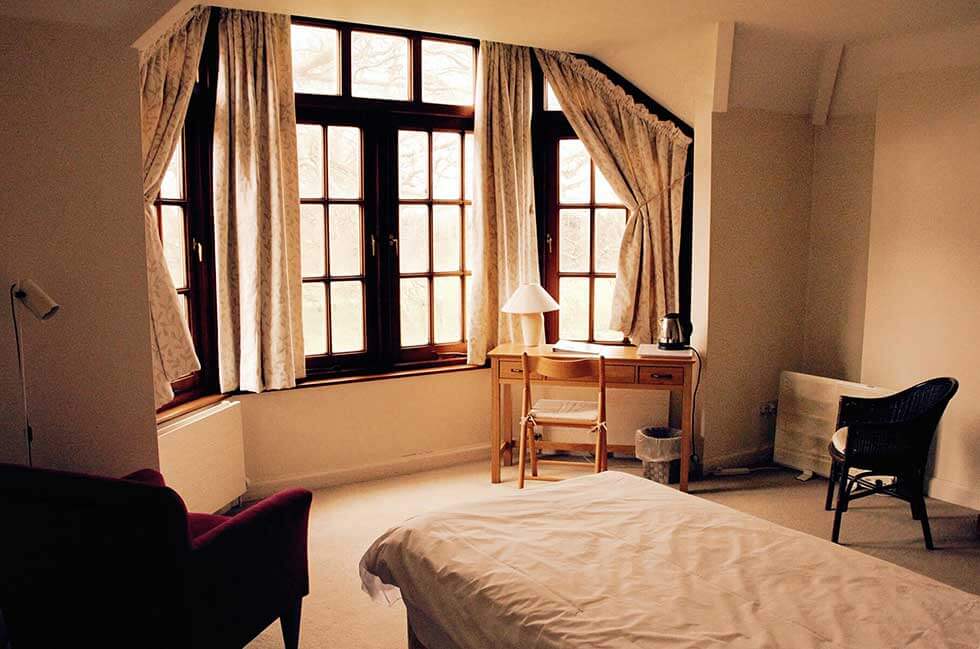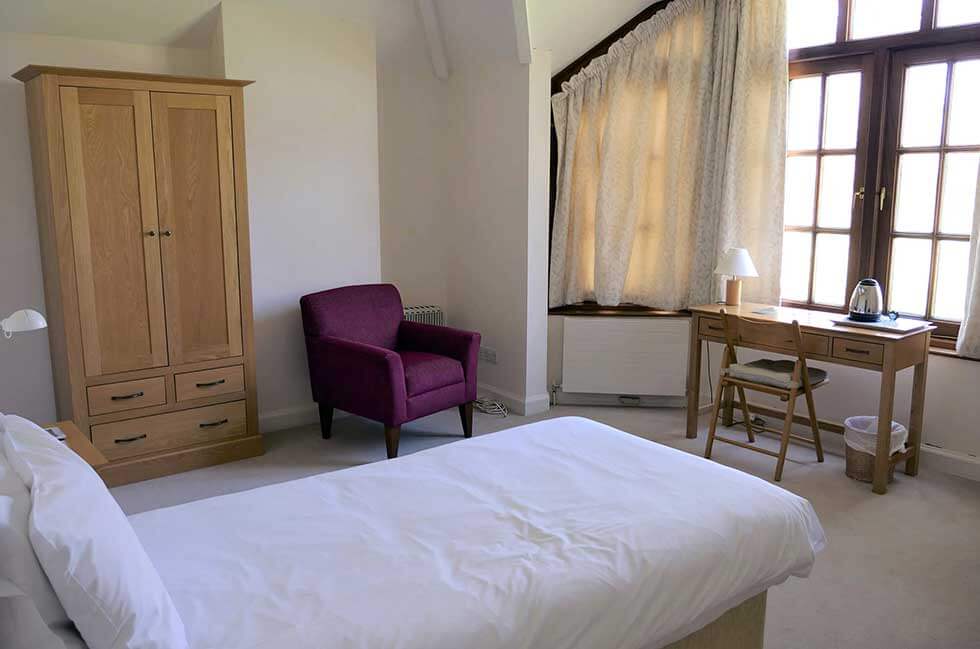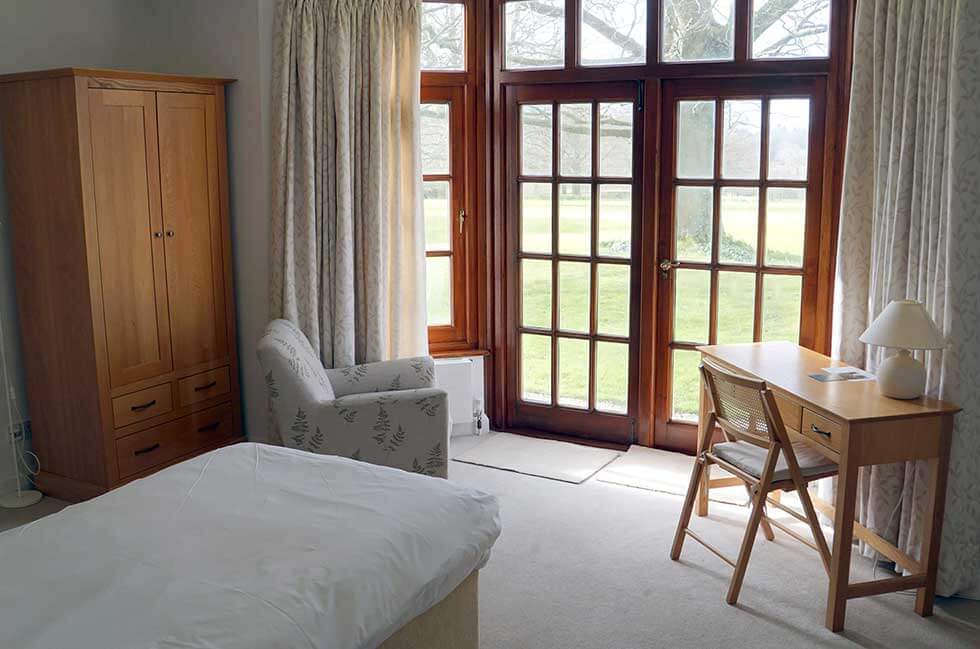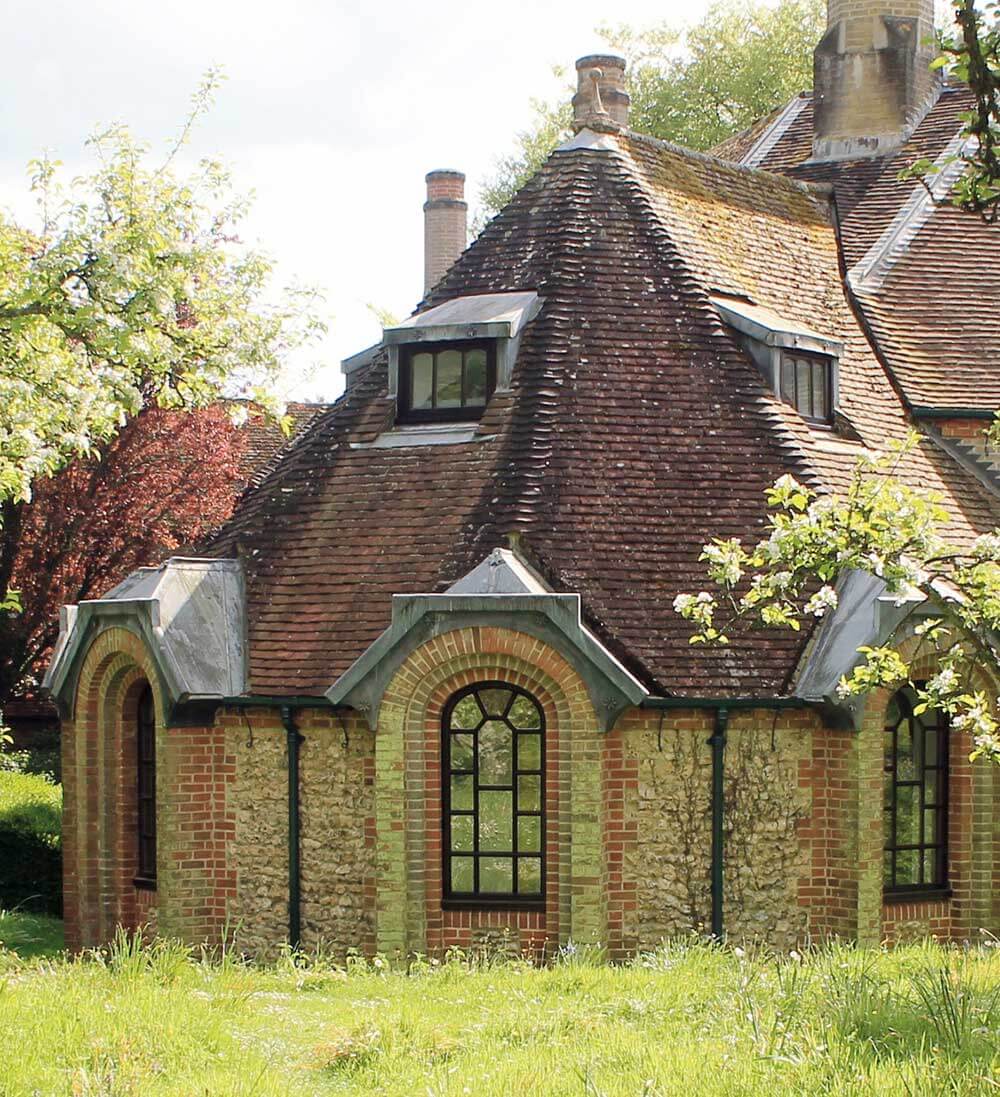
The Intentions of the Centre
The Centre will be a place for all serious people who have left behind them their nationality, their sectarian beliefs and all the other things that divide human beings.
KRISHNAMURTI
From early in Krishnamurti’s life, schools for the young were a part of his concern. After establishing a number of these in different parts of the world, he began to speak of the need to create a centre for adults. It was to be a place of stillness and peace, a source where, undisturbed and away from the distractions of everyday life, those interested in his teachings could study and reflect in depth on the relevance of the teachings to their lives.
In 1982, Krishnamurti described such a centre. He spoke of a place of quiet, a building which should be beautiful but simple, comfortable but austere, where the record of all his teachings would be available for study by people who would bring their own seriousness, interest and inquiry. It was not to be a place for interpretation, where someone would lead others or where studying would be organised or directed by another.
READ – Krishnamurti's Intentions for the Centre: A Conversation
Staff Member: Sir, I wanted to ask you about the proposed centre and what it means to study the teachings.
Krishnamurti: If I went to the centre, first of all I would want to be quiet, not bring problems there; not my household problems, business preoccupations and so on. And also I think I would want what K says to be entirely part of my life, not just that I have studied K and I repeat what he says. Rather, in the very studying of it, I am really absorbing it; not bits of it here and there, not only what suits me.
SM: Can we talk about how that happens because I feel this is where we will decide the nature of the place and its activities?
K: If I went there to study what K is saying, I would want to investigate it, question it, doubt it; not just read something and go away. I would be reading not just to memorise, I would be reading to learn; to see what he is saying and my reactions to it, whether it corresponds or contradicts, whether he is right or I am right, so that there is a constant communication and interchange between what I am reading and what I am feeling. I would want to establish a relationship between what I am reading, seeing, hearing and myself with my reactions, conditioning and so on; a dialogue between him and me. Such a dialogue must inevitably bring about a fundamental change.
Let us say that a man like you comes to this new centre. You take all the trouble to come to this place and, for the first few days, you may want to be quiet. If you are sensitive, you realise there is something here which is different from your home, totally different to going to a discussion somewhere. Then you begin to study, and not only you but all the people living here are studying, looking, questioning. And everyone actually listening with their whole beings will naturally bring about a religious atmosphere.
That is what I would want if I went there. I would be sensitive enough to quickly capture what K is saying. And at lunch, walking or sitting together in the sitting room, I might like to discuss. I might say, ‘Look, I didn’t understand what he meant by that, let’s talk about it’ – not, you tell me about it or I know better – ‘let’s go into it’; so it will be a living thing. And in the afternoon, I might go out for a walk or do some other physical activity.
The study will be a place for all serious people who have left behind them all their nationality, their sectarian beliefs and all the other things that divide human beings.
SM: Can we say more about what it means to study the teachings profoundly?
K: I have made it clear.
SM: Yes. But there is more to it. In organising the centre I also have to ask about my own studying. I realise that if I don’t do this seriously, I have no business working there if I am not doing it.
K: That is understood.
SM: It is this question of the teachings somehow going into the blood.
K: We will get it, sir, I am sure we will get it. As long as we are talking together like this and keep at it.
SM: But Krishnaji, I also feel that it has to be something that does not depend on you.
K: It depends on the teachings.
SM: And on how I relate to the teachings. But from my own relationship with the teachings there are some other things I want to ask about, because there is something else which I feel is important.
K: What is that, briefly?
SM: I have studied the teachings every day for some years. Sometimes studying the teachings for me means even just reading one phrase.
K: Quite right. That’s up to you.
SM: But now, wait. This is it, Krishnaji. That one phrase – somehow holding it during the day in action and in relationship – holding it.
K: Quite right. You are carrying a jewel with you. You are watching all the time or it will get lost.
SM: Now, I wanted to talk about that holding, because to me there is a secret in that holding. There is something very special about that holding that most people don’t know and that I often forget.
K: Yes, sir. Listen carefully. Someone gives me a marvellous watch, superb. And it is such a precious thing – I am very careful. I watch it all day.
SM: Yes.
K: The thing – I don’t have to hold it, it is there in my hands. You follow? I watch. I live with it.
SM: Yes. If I can come back to this, Krishnaji. It is there in your hands. Now, to continue the metaphor, ‘Look, would you please do the dishes: here are the gloves,’ you are not going to keep the watch in your hand, you are going to put it in your pocket, or you are going to do something else with it.
K: But the watch is still ticking away.
SM: Exactly. So, in this centre somehow I feel we want to set up some activities that help people hold this thing all day long.
K: Be careful. Don’t do that. No activity is holding it. No outside help.
SM: No outside help. So perhaps we should not give people so many things to do.
K: Yes, you do all the things you have to do. You must allow for yourself four or five hours, or two hours, whatever you want. I shut my door after two o’clock or some other time, then nobody disturbs me. You must have time to study, to listen, absorb – absorb, so that it is in your blood.
SM: Yes.
K: It is like having a marvellous set of pearls. You put them around your neck and they are always there. You follow?
SM: Can you describe more closely, Krishnaji, without metaphor, when a person reads something extraordinary, how they hold that?
K: Sir, you don’t hold it. The moment you have read that and you see the truth of it, it is yours, you don’t have to hold it. You look at the mountains, you don’t hold them, they are there. You are always conscious of that. You are always looking at it. Even when you are washing dishes, that is there.
SM: Yes.
K: Keep it. Don’t talk any more about it. Keep it. You have understood what it means. Go into it for yourself. You are going to have to talk to the people who come to the centre about this, so you have to be very clear. I might come to the centre and say, ‘What do you think about all this? I would like to discuss with you what K means by meditation, what he means by…’ – you know, all the rest of it. And you must be able to discuss this.
SM: Yes, I know, sir.
K: It’s all right with practical jobs that have to be done for the building, which must be most beautiful, austere. But the other – you have a tremendous responsibility. Don’t minimise it. And don’t be frightened. You have got to do it. It is not easy.
SM: Because here, Krishnaji, we are talking about the sacred, creating something of the sacred.
K: It will come. You can’t just put out your hand and wait.
SM: No.
K: It comes when you live the teachings.
Accommodation
All 20 guestrooms are single en-suite, simply but comfortably furnished and with views of the beautiful grounds. There are four flats for two people sharing, and larger events utilise accommodation a short walk away.
You can book easily and securely using our online booking system and pay by credit or debit card. You may also book by phone on +44 (0)1962 771748.
Additional information regarding accommodation, access for disabled visitors and our rates can be found on our Booking page.
All meals provided are vegetarian. Vegan and gluten-free options can be made available upon request. Please note that we are unable to cater for other dietary preferences
You can see photographs of our guestrooms in our Centre Gallery.
Accommodation
All 20 guestrooms are single en-suite, simply but comfortably furnished and with views of the beautiful grounds. There are four flats for two people sharing, and larger events utilise accommodation a short walk away.
You can book easily and securely using our online booking system and pay by credit or debit card. You may also book by phone on +44 (0)1962 771748.
Additional information regarding accommodation, access for disabled visitors and our rates can be found on our Booking page.
All meals provided are vegetarian. Vegan and gluten-free options can be made available upon request. Please note that we are unable to cater for other dietary preferences
You can see photographs of our guestrooms in our Centre Gallery.
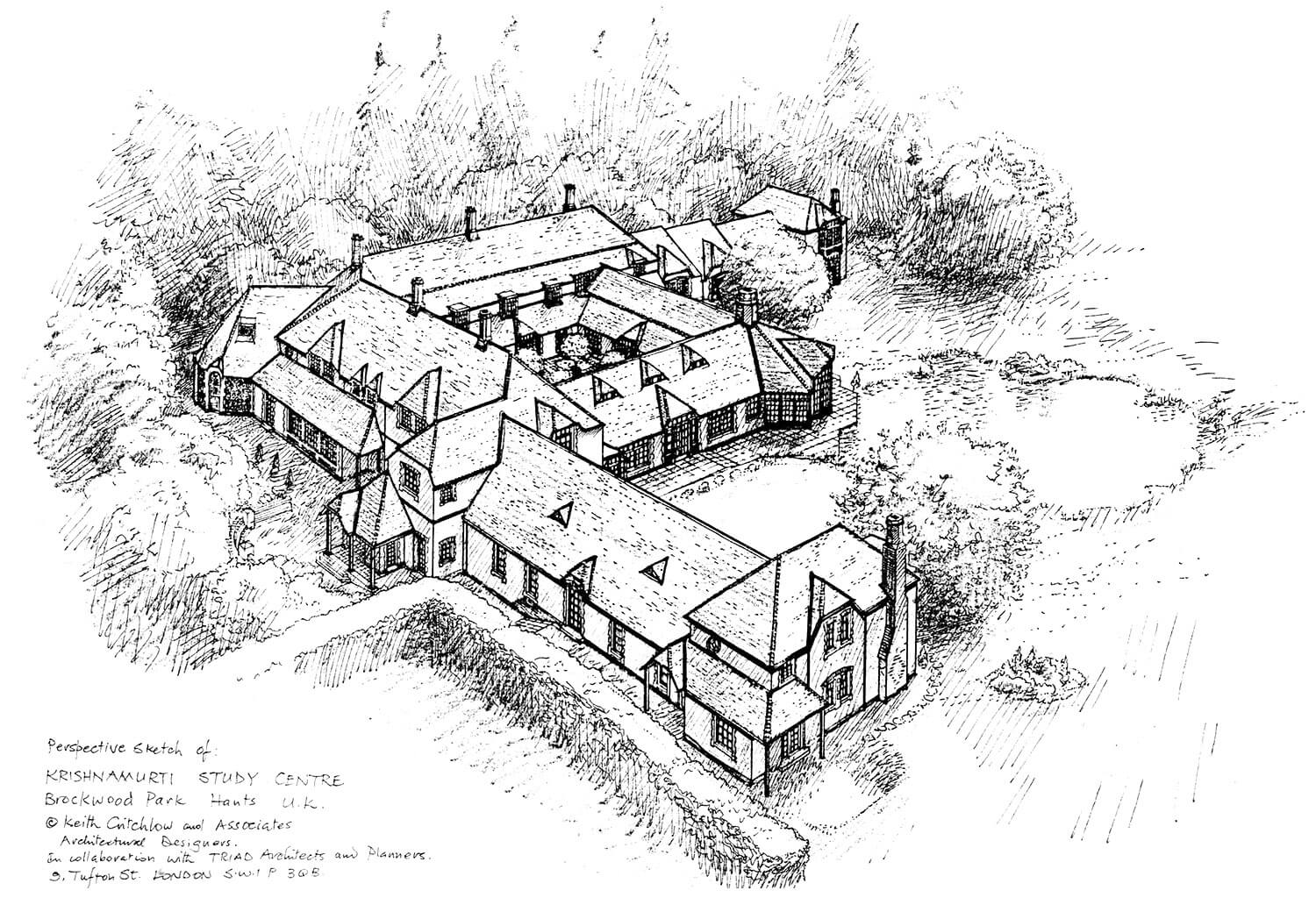
The Building
Created by renowned professor of architecture, Keith Critchlow, the centre has a timeless feel. From the cosy proportions of the guest rooms to the expansive sitting and dining rooms, the building has been designed to inspire and uplift. Light enters from multiple directions, adding to the building’s special atmosphere. Austerity and comfort combined.
The impressive dining and sitting rooms are complemented by the more intimate library and video rooms which provide relaxing space to watch videos and read books. The quiet room is used solely for the purpose of sitting quietly. This remarkable room was, for Krishnamurti, the centre’s most important.
The public rooms and corridors surround a pleasant central courtyard, with its water feature and well-planted garden. There is also a large conservatory with indoor plants and a unique window offering fine views.
The centre also houses Krishnamurti Foundation Trust, with its archives and bookshop, which stocks all of Krishnamurti’s books and select biographies.
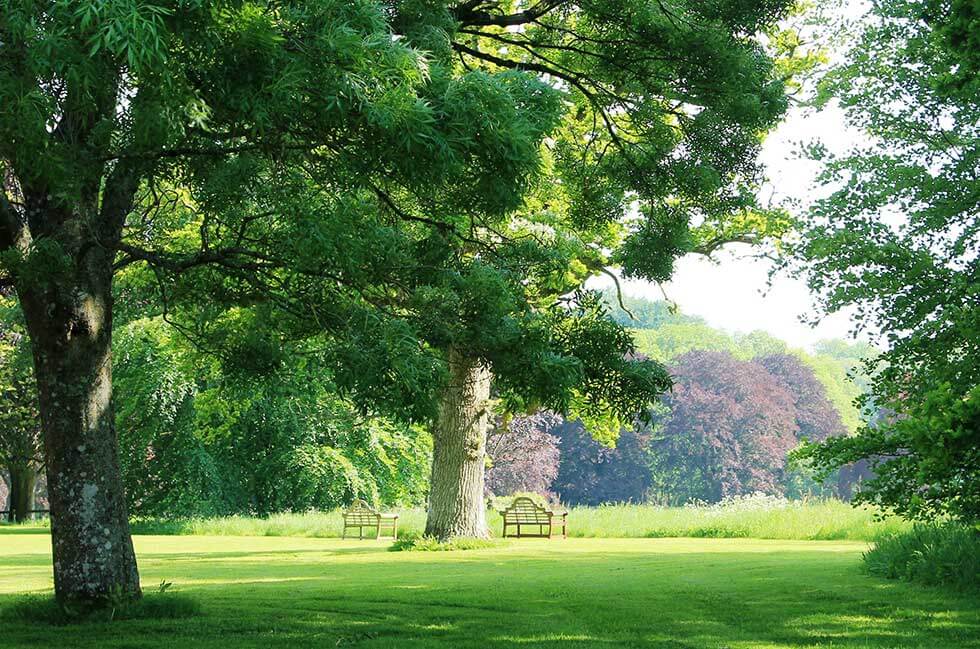
The Grounds
This place must be of great beauty with trees, birds and quietness, for beauty is truth and truth is goodness and love.
KRISHNAMURTI
The centre is surrounded by open space in which to walk or sit. To the south is the expansive lawn with its views to the woods and downs. To the north is the old orchard with a secluded garden and wide hedges. Beyond is the rose garden and open parkland, leading to the grove with its glades and fine trees. The grove for many, including Krishnamurti, is the highlight of Brockwood Park. A place of peace and great beauty, it contains mature sequoias, oaks, chestnuts, conifers, a rare handkerchief tree, rhododendrons and azaleas. It is a delight to visit in spring and early summer when the ground is carpeted with snowdrops, daffodils and bluebells, and the flowering shrubs are in bloom.
The Grounds
This place must be of great beauty with trees, birds and quietness, for beauty is truth and truth is goodness and love.
KRISHNAMURTI
The centre is surrounded by open space in which to walk or sit. To the south is the expansive lawn with its views to the woods and downs. To the north is the old orchard with a secluded garden and wide hedges. Beyond is the rose garden and open parkland, leading to the grove with its glades and fine trees. The grove for many, including Krishnamurti, is the highlight of Brockwood Park. A place of peace and great beauty, it contains mature sequoias, oaks, chestnuts, conifers, a rare handkerchief tree, rhododendrons and azaleas. It is a delight to visit in spring and early summer when the ground is carpeted with snowdrops, daffodils and bluebells, and the flowering shrubs are in bloom.

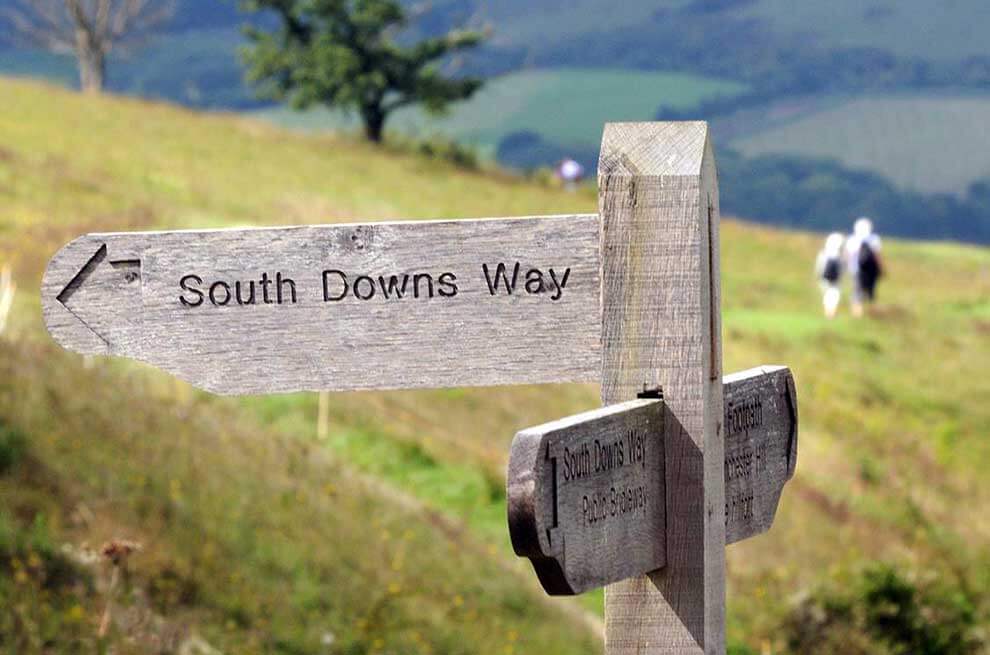
Locality
The Krishnamurti Centre is situated in a quiet part of mid-Hampshire, between Winchester and Petersfield, in the western section of the South Downs National Park. Winchester and Petersfield are easily accessible from London and the south coast by car or public transport. The South Downs offer good walking and cycling routes, whilst the nearby market towns of Alresford, Petersfield and Alton, along with the historic cities of Winchester, Portsmouth and Southampton make for interesting excursions. The centre is surrounded by miles of unspoiled woods, farmland, footpaths and quiet lanes.
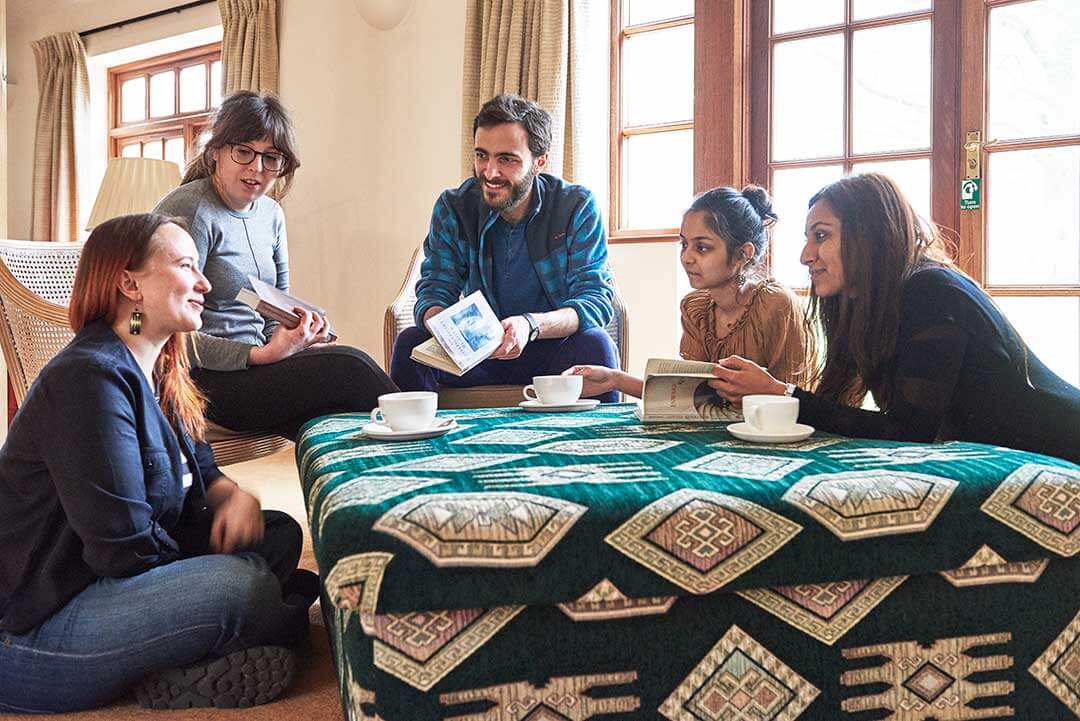
Gallery
Testimonials
Centre guests describe their thoughts, feelings and experiences of visiting the Centre, together with mentions of the centre in the media.
The Krishnamurti Centre at Brockwood Park in Hampshire is remarkable in several ways. It’s an extraordinarily quiet, peaceful place, almost eerily so. If you think of an airport, where increasing quantities of people, commercial activity, hassle, noise are being ever more tightly compressed into a finite space, then Brockwood is the antithesis. There’s a combination of airy space, emptiness and beauty, both architectural and natural (an early 19th-century park planted with magnificent trees).
On arrival, I felt like I’d walked into a wall of silence. There’s such an incredible feeling to the place, which made a strong impact on me, dropping layers and allowing me to come out of my head. The lack of dogma creates space for my own understanding, and I met a wide variety of thoughtful guests from all over the world.
Brockwood for me is the nearest to a totally unspoilt spot on earth, with very little that is artificial or jarring. All kinds of people come, an even spread across gender, cultures, continents and professions. This is the shared home away from home for all of them, with a difference. One does not come here to be preached at or converted, do yoga or meditate, however laudable or therapeutic it may be. Here one comes, I suppose, to find one’s centre, and discover in the end, others in oneself.
The Krishnamurti Centre
Bramdean, Alresford
Hampshire SO24 0LQ
United Kingdom
Telephone: +44 (0)1962 771748
Company Registration No. 1055588
Registered Charity No. 312865
© Krishnamurti Foundation Trust Ltd
The Foundation

